Analyzing Factors That Influence Humanitarian Supply Chain Performance
VerifiedAdded on 2023/01/23
|8
|1501
|56
Thesis and Dissertation
AI Summary
This dissertation delves into the challenges of humanitarian logistics operations, focusing on factors affecting performance. The study highlights a case study in the Republic of South Sudan, examining the impact of political, socio-economic, internal, and infrastructural factors on humanitarian logistics. The research aims to evaluate these factors and their effects, offering recommendations to improve the humanitarian supply chain. The methodology employs an inductive research approach with a descriptive research design, utilizing a case study method and positivism research philosophy. Data collection involves quantitative and qualitative techniques, including questionnaires and focus groups, along with secondary data from reliable sources. The study also addresses limiting factors such as data unavailability and old data, while considering the importance of participant responses. The thesis structure includes a literature review, research methodology, data analysis, and conclusions and recommendations, providing a comprehensive analysis of the humanitarian supply chain's performance and suggesting improvements.
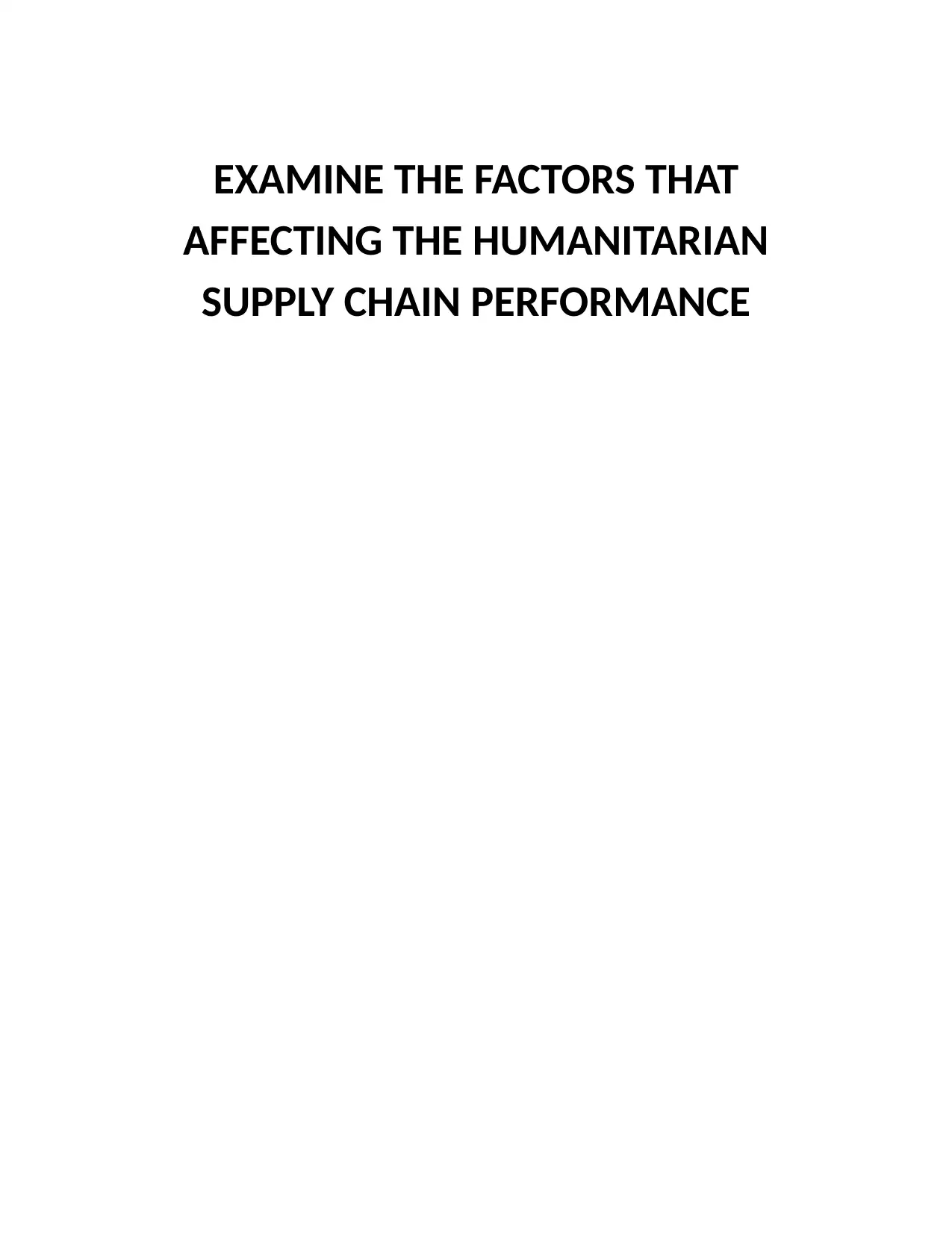
EXAMINE THE FACTORS THAT
AFFECTING THE HUMANITARIAN
SUPPLY CHAIN PERFORMANCE
AFFECTING THE HUMANITARIAN
SUPPLY CHAIN PERFORMANCE
Paraphrase This Document
Need a fresh take? Get an instant paraphrase of this document with our AI Paraphraser
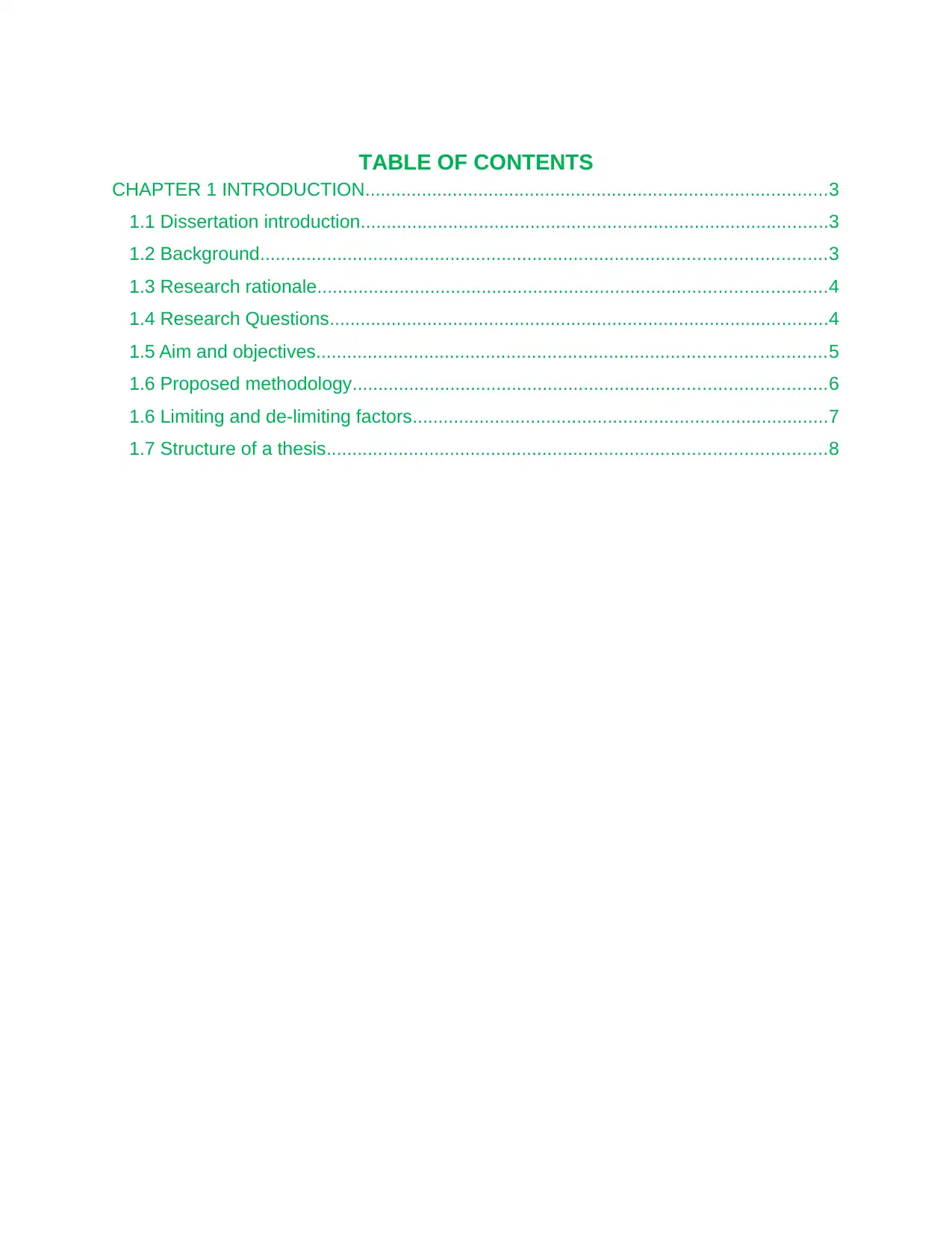
TABLE OF CONTENTS
CHAPTER 1 INTRODUCTION..........................................................................................3
1.1 Dissertation introduction...........................................................................................3
1.2 Background..............................................................................................................3
1.3 Research rationale...................................................................................................4
1.4 Research Questions.................................................................................................4
1.5 Aim and objectives...................................................................................................5
1.6 Proposed methodology............................................................................................6
1.6 Limiting and de-limiting factors.................................................................................7
1.7 Structure of a thesis.................................................................................................8
CHAPTER 1 INTRODUCTION..........................................................................................3
1.1 Dissertation introduction...........................................................................................3
1.2 Background..............................................................................................................3
1.3 Research rationale...................................................................................................4
1.4 Research Questions.................................................................................................4
1.5 Aim and objectives...................................................................................................5
1.6 Proposed methodology............................................................................................6
1.6 Limiting and de-limiting factors.................................................................................7
1.7 Structure of a thesis.................................................................................................8
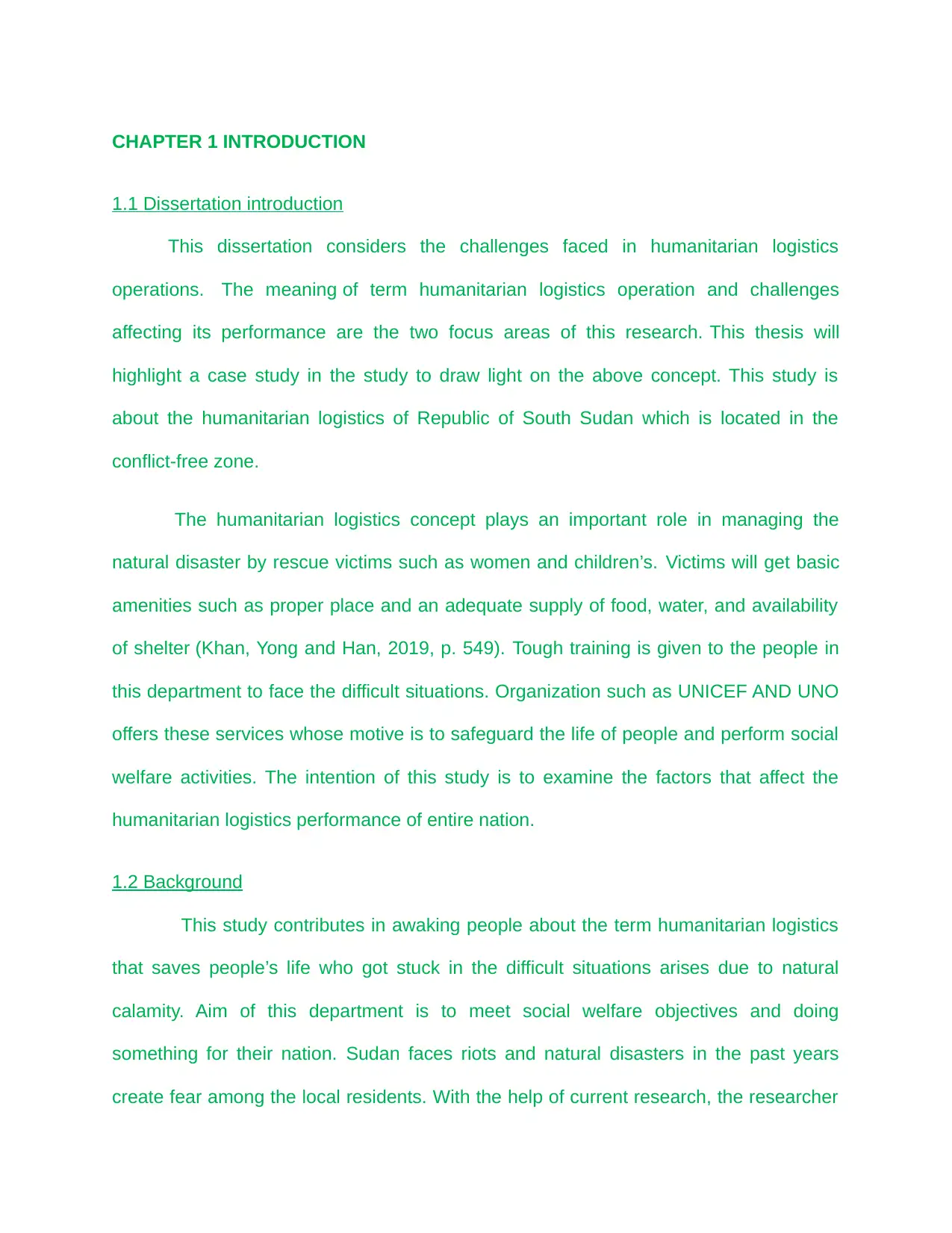
CHAPTER 1 INTRODUCTION
1.1 Dissertation introduction
This dissertation considers the challenges faced in humanitarian logistics
operations. The meaning of term humanitarian logistics operation and challenges
affecting its performance are the two focus areas of this research. This thesis will
highlight a case study in the study to draw light on the above concept. This study is
about the humanitarian logistics of Republic of South Sudan which is located in the
conflict-free zone.
The humanitarian logistics concept plays an important role in managing the
natural disaster by rescue victims such as women and children’s. Victims will get basic
amenities such as proper place and an adequate supply of food, water, and availability
of shelter (Khan, Yong and Han, 2019, p. 549). Tough training is given to the people in
this department to face the difficult situations. Organization such as UNICEF AND UNO
offers these services whose motive is to safeguard the life of people and perform social
welfare activities. The intention of this study is to examine the factors that affect the
humanitarian logistics performance of entire nation.
1.2 Background
This study contributes in awaking people about the term humanitarian logistics
that saves people’s life who got stuck in the difficult situations arises due to natural
calamity. Aim of this department is to meet social welfare objectives and doing
something for their nation. Sudan faces riots and natural disasters in the past years
create fear among the local residents. With the help of current research, the researcher
1.1 Dissertation introduction
This dissertation considers the challenges faced in humanitarian logistics
operations. The meaning of term humanitarian logistics operation and challenges
affecting its performance are the two focus areas of this research. This thesis will
highlight a case study in the study to draw light on the above concept. This study is
about the humanitarian logistics of Republic of South Sudan which is located in the
conflict-free zone.
The humanitarian logistics concept plays an important role in managing the
natural disaster by rescue victims such as women and children’s. Victims will get basic
amenities such as proper place and an adequate supply of food, water, and availability
of shelter (Khan, Yong and Han, 2019, p. 549). Tough training is given to the people in
this department to face the difficult situations. Organization such as UNICEF AND UNO
offers these services whose motive is to safeguard the life of people and perform social
welfare activities. The intention of this study is to examine the factors that affect the
humanitarian logistics performance of entire nation.
1.2 Background
This study contributes in awaking people about the term humanitarian logistics
that saves people’s life who got stuck in the difficult situations arises due to natural
calamity. Aim of this department is to meet social welfare objectives and doing
something for their nation. Sudan faces riots and natural disasters in the past years
create fear among the local residents. With the help of current research, the researcher
⊘ This is a preview!⊘
Do you want full access?
Subscribe today to unlock all pages.

Trusted by 1+ million students worldwide
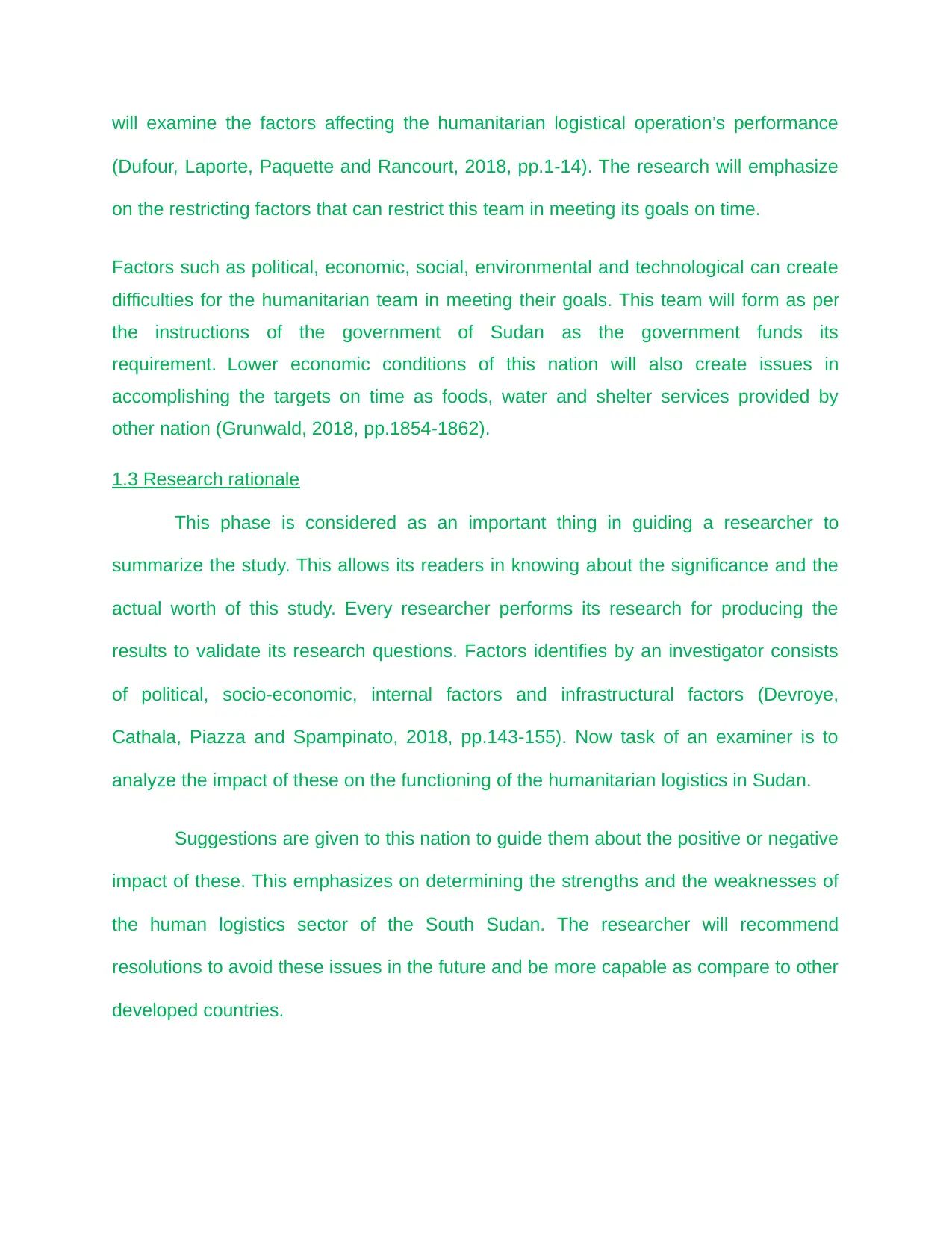
will examine the factors affecting the humanitarian logistical operation’s performance
(Dufour, Laporte, Paquette and Rancourt, 2018, pp.1-14). The research will emphasize
on the restricting factors that can restrict this team in meeting its goals on time.
Factors such as political, economic, social, environmental and technological can create
difficulties for the humanitarian team in meeting their goals. This team will form as per
the instructions of the government of Sudan as the government funds its
requirement. Lower economic conditions of this nation will also create issues in
accomplishing the targets on time as foods, water and shelter services provided by
other nation (Grunwald, 2018, pp.1854-1862).
1.3 Research rationale
This phase is considered as an important thing in guiding a researcher to
summarize the study. This allows its readers in knowing about the significance and the
actual worth of this study. Every researcher performs its research for producing the
results to validate its research questions. Factors identifies by an investigator consists
of political, socio-economic, internal factors and infrastructural factors (Devroye,
Cathala, Piazza and Spampinato, 2018, pp.143-155). Now task of an examiner is to
analyze the impact of these on the functioning of the humanitarian logistics in Sudan.
Suggestions are given to this nation to guide them about the positive or negative
impact of these. This emphasizes on determining the strengths and the weaknesses of
the human logistics sector of the South Sudan. The researcher will recommend
resolutions to avoid these issues in the future and be more capable as compare to other
developed countries.
(Dufour, Laporte, Paquette and Rancourt, 2018, pp.1-14). The research will emphasize
on the restricting factors that can restrict this team in meeting its goals on time.
Factors such as political, economic, social, environmental and technological can create
difficulties for the humanitarian team in meeting their goals. This team will form as per
the instructions of the government of Sudan as the government funds its
requirement. Lower economic conditions of this nation will also create issues in
accomplishing the targets on time as foods, water and shelter services provided by
other nation (Grunwald, 2018, pp.1854-1862).
1.3 Research rationale
This phase is considered as an important thing in guiding a researcher to
summarize the study. This allows its readers in knowing about the significance and the
actual worth of this study. Every researcher performs its research for producing the
results to validate its research questions. Factors identifies by an investigator consists
of political, socio-economic, internal factors and infrastructural factors (Devroye,
Cathala, Piazza and Spampinato, 2018, pp.143-155). Now task of an examiner is to
analyze the impact of these on the functioning of the humanitarian logistics in Sudan.
Suggestions are given to this nation to guide them about the positive or negative
impact of these. This emphasizes on determining the strengths and the weaknesses of
the human logistics sector of the South Sudan. The researcher will recommend
resolutions to avoid these issues in the future and be more capable as compare to other
developed countries.
Paraphrase This Document
Need a fresh take? Get an instant paraphrase of this document with our AI Paraphraser
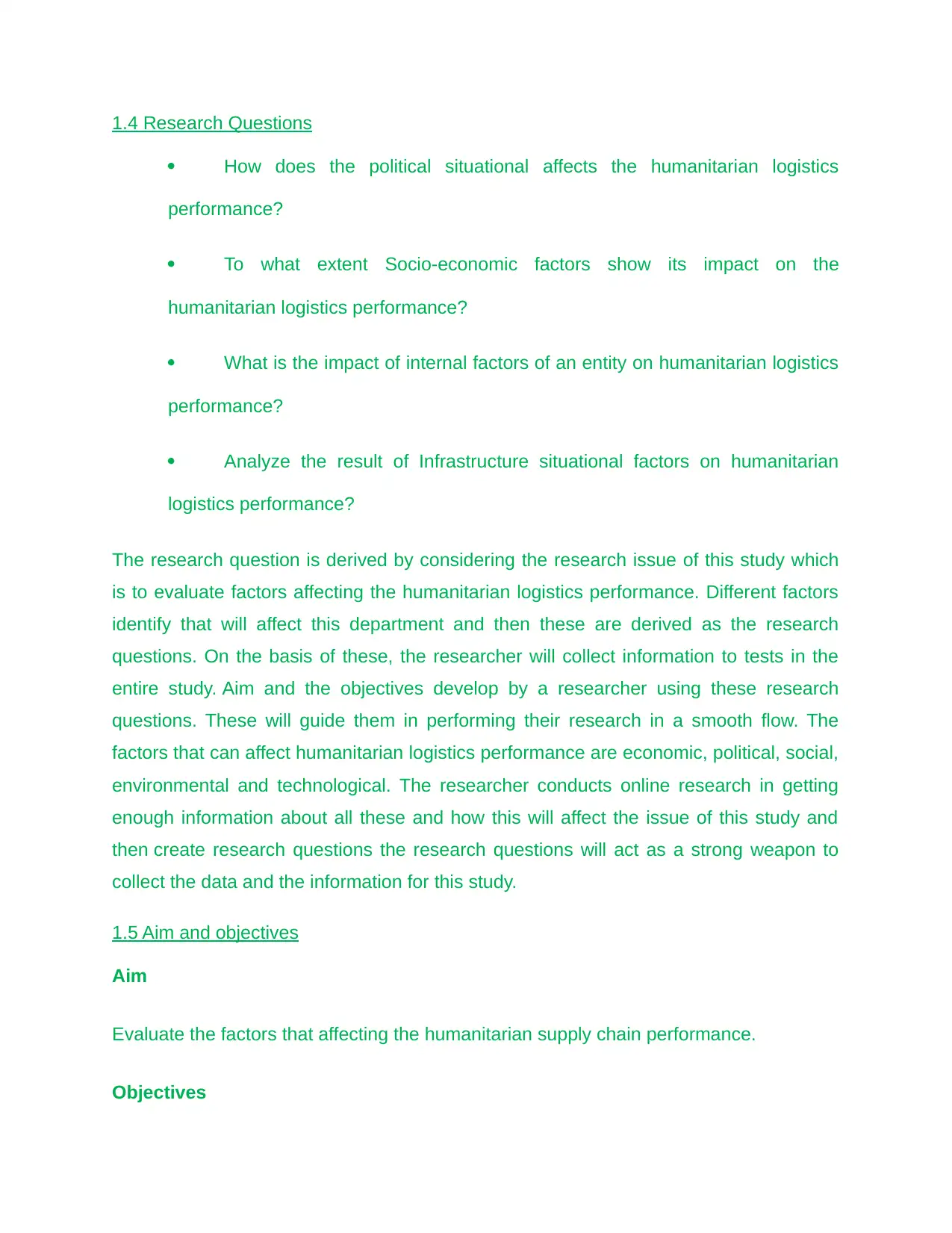
1.4 Research Questions
How does the political situational affects the humanitarian logistics
performance?
To what extent Socio-economic factors show its impact on the
humanitarian logistics performance?
What is the impact of internal factors of an entity on humanitarian logistics
performance?
Analyze the result of Infrastructure situational factors on humanitarian
logistics performance?
The research question is derived by considering the research issue of this study which
is to evaluate factors affecting the humanitarian logistics performance. Different factors
identify that will affect this department and then these are derived as the research
questions. On the basis of these, the researcher will collect information to tests in the
entire study. Aim and the objectives develop by a researcher using these research
questions. These will guide them in performing their research in a smooth flow. The
factors that can affect humanitarian logistics performance are economic, political, social,
environmental and technological. The researcher conducts online research in getting
enough information about all these and how this will affect the issue of this study and
then create research questions the research questions will act as a strong weapon to
collect the data and the information for this study.
1.5 Aim and objectives
Aim
Evaluate the factors that affecting the humanitarian supply chain performance.
Objectives
How does the political situational affects the humanitarian logistics
performance?
To what extent Socio-economic factors show its impact on the
humanitarian logistics performance?
What is the impact of internal factors of an entity on humanitarian logistics
performance?
Analyze the result of Infrastructure situational factors on humanitarian
logistics performance?
The research question is derived by considering the research issue of this study which
is to evaluate factors affecting the humanitarian logistics performance. Different factors
identify that will affect this department and then these are derived as the research
questions. On the basis of these, the researcher will collect information to tests in the
entire study. Aim and the objectives develop by a researcher using these research
questions. These will guide them in performing their research in a smooth flow. The
factors that can affect humanitarian logistics performance are economic, political, social,
environmental and technological. The researcher conducts online research in getting
enough information about all these and how this will affect the issue of this study and
then create research questions the research questions will act as a strong weapon to
collect the data and the information for this study.
1.5 Aim and objectives
Aim
Evaluate the factors that affecting the humanitarian supply chain performance.
Objectives
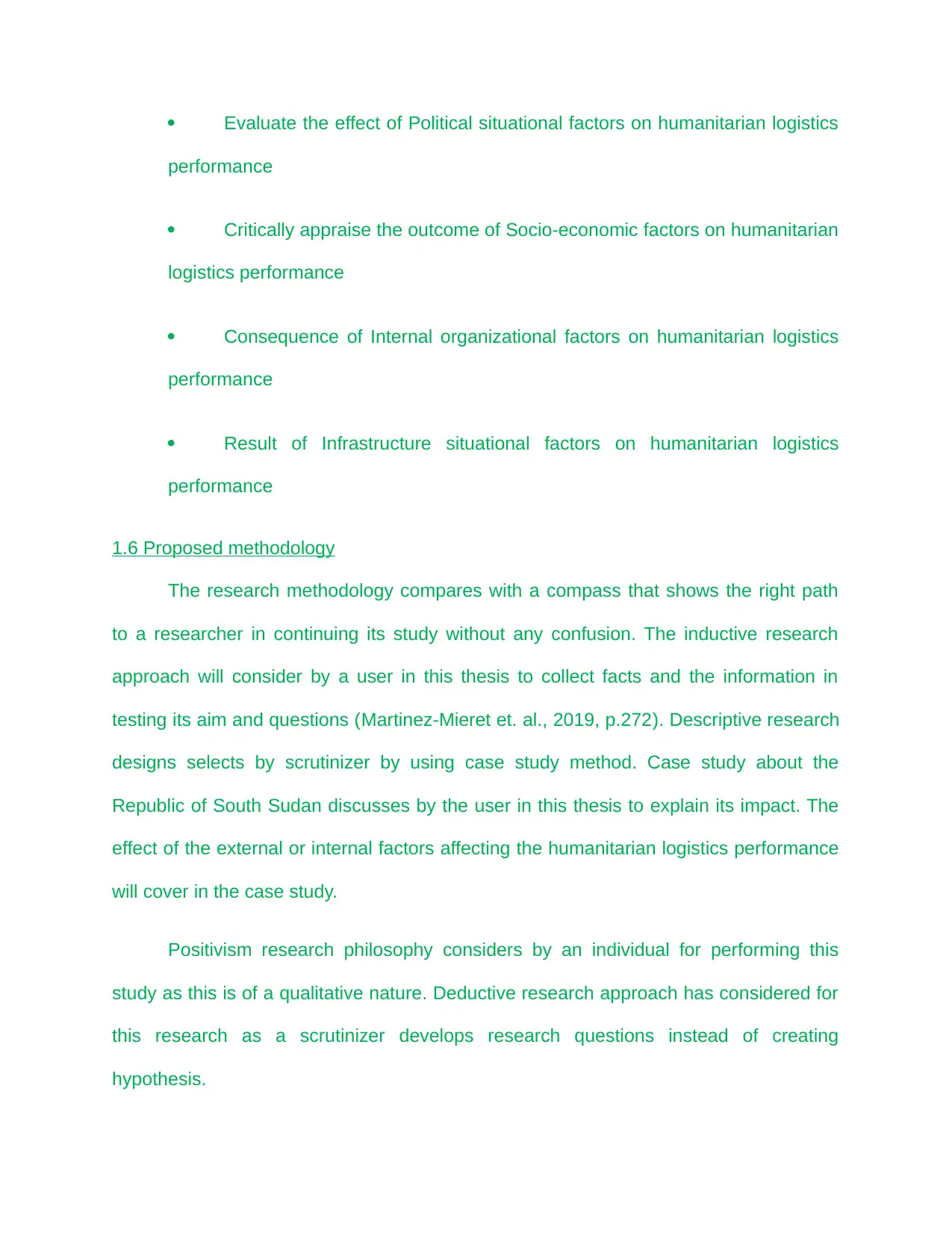
Evaluate the effect of Political situational factors on humanitarian logistics
performance
Critically appraise the outcome of Socio-economic factors on humanitarian
logistics performance
Consequence of Internal organizational factors on humanitarian logistics
performance
Result of Infrastructure situational factors on humanitarian logistics
performance
1.6 Proposed methodology
The research methodology compares with a compass that shows the right path
to a researcher in continuing its study without any confusion. The inductive research
approach will consider by a user in this thesis to collect facts and the information in
testing its aim and questions (Martinez-Mieret et. al., 2019, p.272). Descriptive research
designs selects by scrutinizer by using case study method. Case study about the
Republic of South Sudan discusses by the user in this thesis to explain its impact. The
effect of the external or internal factors affecting the humanitarian logistics performance
will cover in the case study.
Positivism research philosophy considers by an individual for performing this
study as this is of a qualitative nature. Deductive research approach has considered for
this research as a scrutinizer develops research questions instead of creating
hypothesis.
performance
Critically appraise the outcome of Socio-economic factors on humanitarian
logistics performance
Consequence of Internal organizational factors on humanitarian logistics
performance
Result of Infrastructure situational factors on humanitarian logistics
performance
1.6 Proposed methodology
The research methodology compares with a compass that shows the right path
to a researcher in continuing its study without any confusion. The inductive research
approach will consider by a user in this thesis to collect facts and the information in
testing its aim and questions (Martinez-Mieret et. al., 2019, p.272). Descriptive research
designs selects by scrutinizer by using case study method. Case study about the
Republic of South Sudan discusses by the user in this thesis to explain its impact. The
effect of the external or internal factors affecting the humanitarian logistics performance
will cover in the case study.
Positivism research philosophy considers by an individual for performing this
study as this is of a qualitative nature. Deductive research approach has considered for
this research as a scrutinizer develops research questions instead of creating
hypothesis.
⊘ This is a preview!⊘
Do you want full access?
Subscribe today to unlock all pages.

Trusted by 1+ million students worldwide
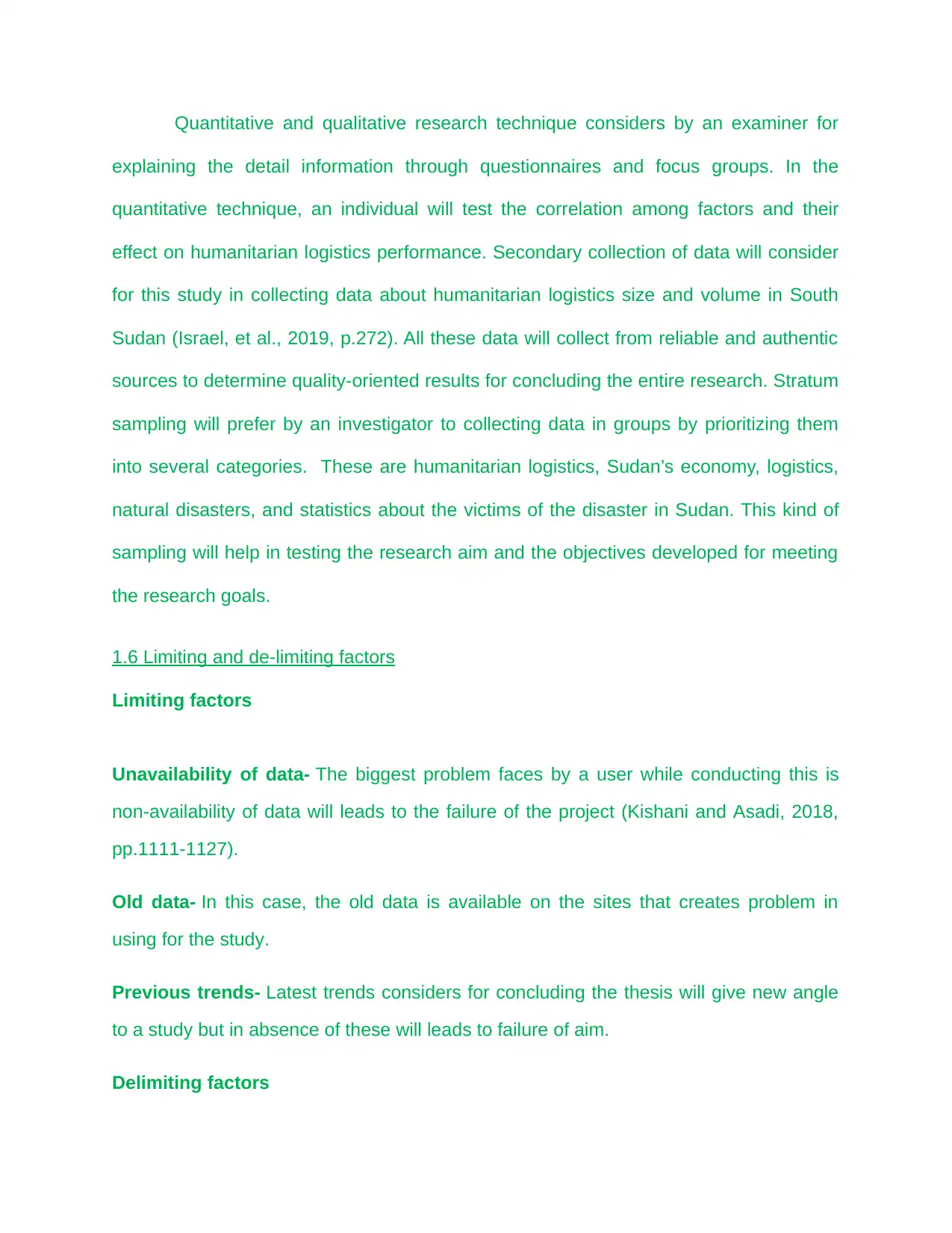
Quantitative and qualitative research technique considers by an examiner for
explaining the detail information through questionnaires and focus groups. In the
quantitative technique, an individual will test the correlation among factors and their
effect on humanitarian logistics performance. Secondary collection of data will consider
for this study in collecting data about humanitarian logistics size and volume in South
Sudan (Israel, et al., 2019, p.272). All these data will collect from reliable and authentic
sources to determine quality-oriented results for concluding the entire research. Stratum
sampling will prefer by an investigator to collecting data in groups by prioritizing them
into several categories. These are humanitarian logistics, Sudan’s economy, logistics,
natural disasters, and statistics about the victims of the disaster in Sudan. This kind of
sampling will help in testing the research aim and the objectives developed for meeting
the research goals.
1.6 Limiting and de-limiting factors
Limiting factors
Unavailability of data- The biggest problem faces by a user while conducting this is
non-availability of data will leads to the failure of the project (Kishani and Asadi, 2018,
pp.1111-1127).
Old data- In this case, the old data is available on the sites that creates problem in
using for the study.
Previous trends- Latest trends considers for concluding the thesis will give new angle
to a study but in absence of these will leads to failure of aim.
Delimiting factors
explaining the detail information through questionnaires and focus groups. In the
quantitative technique, an individual will test the correlation among factors and their
effect on humanitarian logistics performance. Secondary collection of data will consider
for this study in collecting data about humanitarian logistics size and volume in South
Sudan (Israel, et al., 2019, p.272). All these data will collect from reliable and authentic
sources to determine quality-oriented results for concluding the entire research. Stratum
sampling will prefer by an investigator to collecting data in groups by prioritizing them
into several categories. These are humanitarian logistics, Sudan’s economy, logistics,
natural disasters, and statistics about the victims of the disaster in Sudan. This kind of
sampling will help in testing the research aim and the objectives developed for meeting
the research goals.
1.6 Limiting and de-limiting factors
Limiting factors
Unavailability of data- The biggest problem faces by a user while conducting this is
non-availability of data will leads to the failure of the project (Kishani and Asadi, 2018,
pp.1111-1127).
Old data- In this case, the old data is available on the sites that creates problem in
using for the study.
Previous trends- Latest trends considers for concluding the thesis will give new angle
to a study but in absence of these will leads to failure of aim.
Delimiting factors
Paraphrase This Document
Need a fresh take? Get an instant paraphrase of this document with our AI Paraphraser
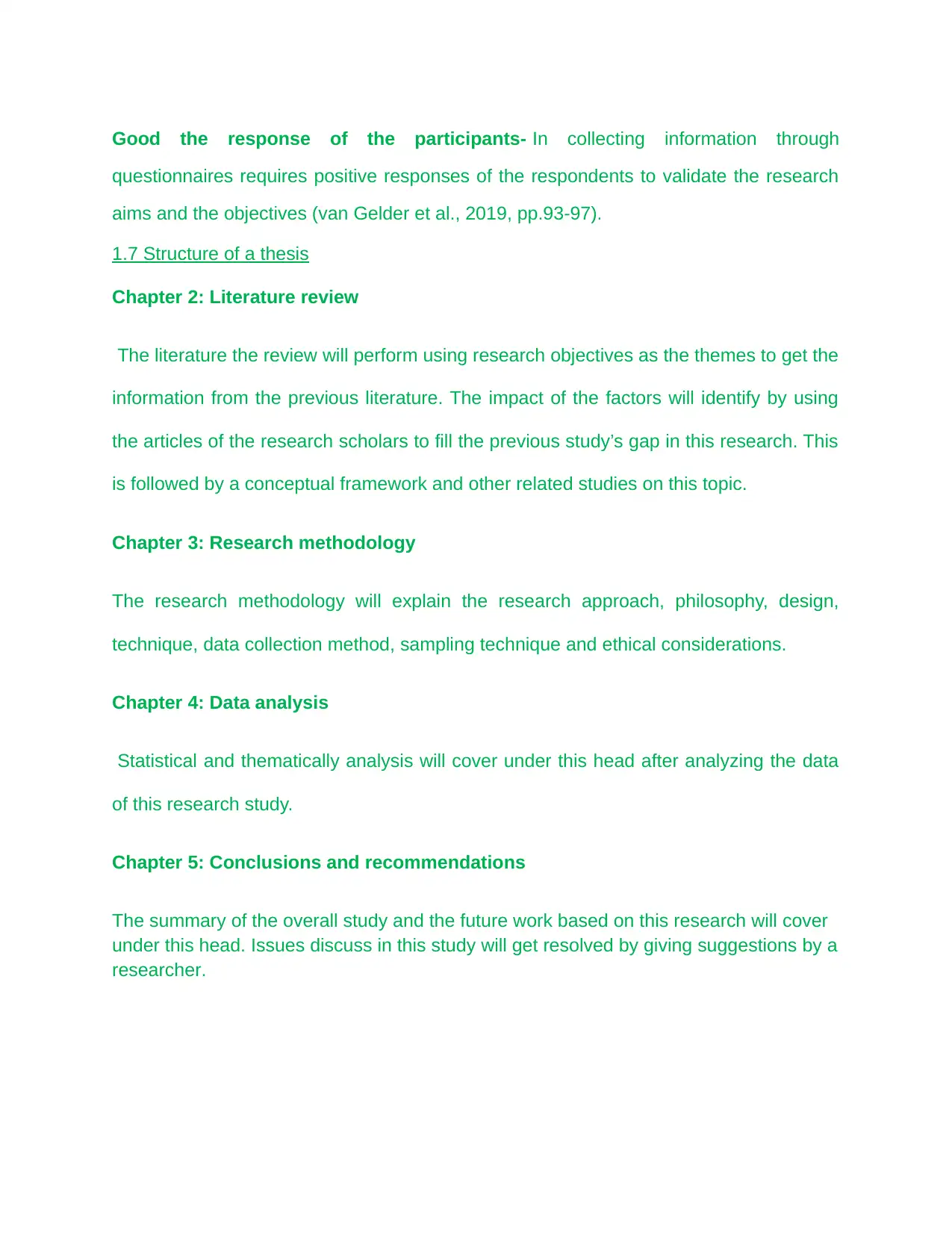
Good the response of the participants- In collecting information through
questionnaires requires positive responses of the respondents to validate the research
aims and the objectives (van Gelder et al., 2019, pp.93-97).
1.7 Structure of a thesis
Chapter 2: Literature review
The literature the review will perform using research objectives as the themes to get the
information from the previous literature. The impact of the factors will identify by using
the articles of the research scholars to fill the previous study’s gap in this research. This
is followed by a conceptual framework and other related studies on this topic.
Chapter 3: Research methodology
The research methodology will explain the research approach, philosophy, design,
technique, data collection method, sampling technique and ethical considerations.
Chapter 4: Data analysis
Statistical and thematically analysis will cover under this head after analyzing the data
of this research study.
Chapter 5: Conclusions and recommendations
The summary of the overall study and the future work based on this research will cover
under this head. Issues discuss in this study will get resolved by giving suggestions by a
researcher.
questionnaires requires positive responses of the respondents to validate the research
aims and the objectives (van Gelder et al., 2019, pp.93-97).
1.7 Structure of a thesis
Chapter 2: Literature review
The literature the review will perform using research objectives as the themes to get the
information from the previous literature. The impact of the factors will identify by using
the articles of the research scholars to fill the previous study’s gap in this research. This
is followed by a conceptual framework and other related studies on this topic.
Chapter 3: Research methodology
The research methodology will explain the research approach, philosophy, design,
technique, data collection method, sampling technique and ethical considerations.
Chapter 4: Data analysis
Statistical and thematically analysis will cover under this head after analyzing the data
of this research study.
Chapter 5: Conclusions and recommendations
The summary of the overall study and the future work based on this research will cover
under this head. Issues discuss in this study will get resolved by giving suggestions by a
researcher.
1 out of 8
Related Documents
Your All-in-One AI-Powered Toolkit for Academic Success.
+13062052269
info@desklib.com
Available 24*7 on WhatsApp / Email
![[object Object]](/_next/static/media/star-bottom.7253800d.svg)
Unlock your academic potential
Copyright © 2020–2026 A2Z Services. All Rights Reserved. Developed and managed by ZUCOL.





